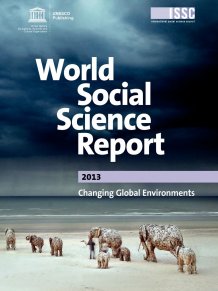
Image: Courtesy of the OECD
University researchers highlight environmental challenges and their social causes and solutions in World Social Science Report
The University of Exeter’s Professors Katrina Brown and Neil Adger, and Drs Saffron O'Neill and Helen Adams have contributed to the prestigious World Social Science Report published today, Friday 15 November 2013.
The World Social Science Report 2013 is prepared by the International Social Sciences Council and sets the agenda for social sciences globally, addresses important social science challenges, takes stock of social science contributions and capacities, and makes recommendations for future research, practice, and policy. It is a key publication for the formation of policy, funding and research priorities.
This year’s report on changing global environments draws on analysis by 150 of the world’s leading social scientists engaged in promoting environmental sustainability and tackling the global challenges and implications of environmental change. Its aim is to call on users of research to deliver solutions-oriented knowledge on today’s most pressing environmental problems.
Professor Katrina Brown, of the University of Exeter’s Environment and Sustainability Institute, has contributed a chapter to the report in conjunction with Geography’s Dr Saffron O'Neill and Professor Christo Fabricius of the Nelson Mandela Metropolitan University, South Africa. They analyse the prospects for radical transformational change ranging from significant dematerialisation of the global economy through to living with a significantly altered climate in decades to come.
Speaking of the chapter, and its value in informing the environmental change debate, Professor Brown said: “Whatever the future, it will be transformed from that of the present, and environmental change will be one of the most significant factors. Without understanding its social dimensions, and robust social science, our ability to steer transformation to benefit humanity will be very limited.”
In a separate chapter, Professor Neil Adger and Dr Helen Adams, from the department of Geography at the University analysed the role of mobility and demographic change in the transformation of global environments. Speaking of their chapter, Professor Adger said: “While commentators focus on how many people there are likely to be in the world in the future, we show that other demographic issues, such as the propensity for migration, mobility, and ageing populations are having more profound effects. Hence robust and comprehensive social science is key to understanding those dimensions.”
Click here to download the World Social Science Report 2013: Changing Global Environments.
Date: 15 November 2013
